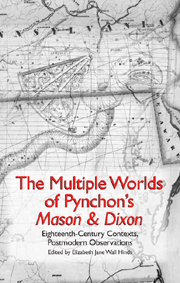 The Multiple Worlds of Pynchon's 'Mason and Dixon'
The Multiple Worlds of Pynchon's 'Mason and Dixon' Published online by Cambridge University Press: 12 September 2012
IN DECEMBER OF 1998, the Modern Language Association hosted, in San Francisco, its first session solely devoted to Mason & Dixon, which had just been released in 1997. Having fallen utterly under its spell, I co-wrote, with my colleague John Loftis, a paper for that session, and after our early morning MLA presentation, all of the presenters — Terry Reilly, Hans-Joachim Berressem, Frank Palmeri, John and I — went out for breakfast.
Trained as an eighteenth-century Americanist, I had spent some years alternating between studies of eighteenth-century subjects and, as a kind of palate cleanser, publications on postmodern cultural subjects like Star Trek, heavy metal music, and increasingly, on Thomas Pynchon's novels. So when Mason & Dixon was published, I was ecstatic. I thought surely this novel was for me, in some scholarly-mystical way — that I was uniquely suited to study it because of my clever, switch-hitting, eighteenth-century and postmodern research agenda. The MLA post-session breakfast turned out to be a real eye opener: everyone sitting at that table, we all learned, had had the same rather solipsistic thought. All of us were eighteenth-century specialists, and all had “dabbled” in Pynchon studies over the years. But there was not a dilettante among us; we brought to the table a wealth of cultural-historical knowledge that seemed specifically positioned to unpack the bizarre, real-unreal, historical-modern landscape of Mason & Dixon.
To save this book to your Kindle, first ensure [email protected] is added to your Approved Personal Document E-mail List under your Personal Document Settings on the Manage Your Content and Devices page of your Amazon account. Then enter the ‘name’ part of your Kindle email address below. Find out more about saving to your Kindle.
Note you can select to save to either the @free.kindle.com or @kindle.com variations. ‘@free.kindle.com’ emails are free but can only be saved to your device when it is connected to wi-fi. ‘@kindle.com’ emails can be delivered even when you are not connected to wi-fi, but note that service fees apply.
Find out more about the Kindle Personal Document Service.
To save content items to your account, please confirm that you agree to abide by our usage policies. If this is the first time you use this feature, you will be asked to authorise Cambridge Core to connect with your account. Find out more about saving content to Dropbox.
To save content items to your account, please confirm that you agree to abide by our usage policies. If this is the first time you use this feature, you will be asked to authorise Cambridge Core to connect with your account. Find out more about saving content to Google Drive.